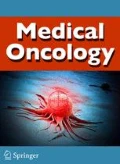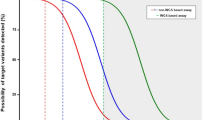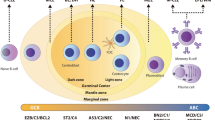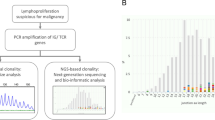Abstract
MAGE-A are normally expressed in testis and placenta. Among MAGEs, the MAGE-A subtype has been the most characterized in cancers. Our study was conducted to assess the expression of (MAGE-A1–MAGE-A6) m-RNA using MMRPs and MAGE-A12 m-RNA in blood for evaluating their clinical implications in breast cancer patients. RT-PCR was carried out to detect the expression of (MAGE-A1–MAGE-A6) m-RNA using MMRPs and MAGE-A12 m-RNA in blood. The study included 100 breast cancer cases aged 41–62 years and 100 controls aged 36–53 years. MAGE m-RNA expression was not detected in healthy donors. In breast cancer patients, the positivity of (MAGE-A1–MAGE-A6) m-RNA was 44 % (44 cases), while MAGE-A12 m-RNA was expressed in 13 % (13 cases). The gene expressions of MAGE-A1–A6 and MAGE-A12 were significantly associated with advanced TNM stages (P = 0.001 and 0.034, respectively). Simultaneous estimation of the gene expressions of MAGE-A1–A6 and MAGE-A12 can detect occult hematogenous dissemination of tumor cells and may help to monitor the effectiveness of the therapy and the development of effective immunotherapeutic strategies in breast cancer.



Similar content being viewed by others
Abbreviations
- CTC:
-
Circulating tumor cells
- MAGE:
-
Melanoma-associated antigen gene
- RT-PCR:
-
Reverse transcription-polymerase chain reaction
- MMRPs:
-
Multiple MAGE-recognizing primers
- FNAC:
-
Fine needle aspiration cytology
- PBMCs:
-
Peripheral blood mononuclear cells
- DEPC:
-
Diethylpyrocarbonate
- CEA:
-
Carcinoembryonic antigen
References
Barker PA, Salehi A. The MAGE proteins: emerging roles in cell cycle progression, apoptosis, and neurogenetic disease. J Neurosci Res. 2002;67(6):705–12.
Carter CL, Allen C, Henson DE. Relation of tumor size, lymph node status, and survival in 24,740 breast cancer cases. Cancer. 1989;63:181–7.
Chen CH, Huang GT, Lee HS, Yang PM, Yan MD, Chen DS. High frequency of expression of MAGE genes in human hepatocellular carcinoma. Liver. 1999;19:110–4.
Chomez P, De Backer O, Bertrand M, De Plaen E, Boon T, Lucas S. An overview of the MAGE gene family with the identification of all human members of the family. Cancer Res. 2001;61:5544–51.
Häffner AC, Tassis A, Zepter K, Storz M, Tureci O, Burg G, Nestle FO. Expression of cancer/testis antigens in cutaneous T cell lymphomas. Int J Cancer. 2002;97:668–70.
Kufer P, Zippelius A, Lutterbüse R, Mecklenburg I, Enzmann T, Montag A, et al. Heterogeneous expression of MAGE-A genes in occult disseminated tumor cells: a novel multimarker reverse transcription-polymerase chain reaction for diagnosis of micrometastatic disease. Cancer Res. 2002;62:251–61.
Kwon S, Kang SH, Ro J, Jeon CH, Park JW, Lee ES. The melanoma antigen gene as a surveillance marker for the detection of circulating tumor cells in patients with breast carcinoma. Cancer. 2005;104(2):251–6.
Mou DC, Cai SL, Peng JR, Wang Y, Chen HS, Pang XW, Leng XS, Chen WF. Evaluation of MAGE-1 and MAGE-3 as tumor-specific markers to detect blood dissemination of hepatocellular carcinoma cells. Br J Cancer. 2002;86(1):110–6.
Otte M, Zafrakas M, Riethdorf L, Pichlmeier U, Loning T, Janicke F, Pantel K. MAGE-A gene expression pattern in primary breast cancer. Cancer Res. 2001;61:6682–7.
Paik S, Kim C, Wolmark N. HER2 status and benefit from adjuvant trastuzumab in breast cancer. N Engl J Med. 2008;358(13):1409–11.
Park JW, Kwon TK, Kim IH, Sohn SS, Kim YS, Kim CI, et al. A new strategy for the diagnosis of MAGE-expressing cancers. J Immunol Methods. 2002;266:79–86.
Sang M, Lian Y, Zhou X, Shan B. MAGE-A family: attractive targets for cancer immunotherapy. Vaccine. 2011;29:8496–500.
Serrano A, Lethé B, Delroisse J, Lurquin C, De Plaen E, Brasseur F, Rimoldi D, Boon T. Quantitative evaluation of the expression of MAGE genes in tumors by limiting dilution of cDNA libraries. Int J Cancer. 1999;83(5):664–9.
Simpson AJ, Caballero OL, Jungbluth A, Chen YT, Old LJ. Cancer/testis antigens, gametogenesis and cancer. Nat Rev Cancer. 2005;5:615–25.
Van der Bruggen P, Traversari C, Chomez P, Lurquin C, De Plaen E, Van den Eynde B. A gene encoding an antigen recognized by cytolytic T lymphocytes on a human melanoma. Science. 1991;254:1643–7.
Zhang L, Riethdorf S, Wu G, Wang T, Yang K, Peng G, Liu J, Pantel K. Meta-analysis of the prognostic value of circulating tumor cells in breast cancer. Clin Cancer Res. 2012;18:5701–10.
Zhao ZL, Lu F, Zhu F, Yang H, Chai YB, Chen SM. Cloning and biological comparison of Restin, a novel member of Mage superfamily. Sci. China C Life Sci. 2002;45:412–20.
Conflict of interest
None.
Author information
Authors and Affiliations
Corresponding author
Rights and permissions
About this article
Cite this article
Abd-Elsalam, E.AE., Ismaeil, N.A. Melanoma-associated antigen genes: a new trend to predict the prognosis of breast cancer patients. Med Oncol 31, 285 (2014). https://doi.org/10.1007/s12032-014-0285-0
Received:
Accepted:
Published:
DOI: https://doi.org/10.1007/s12032-014-0285-0




